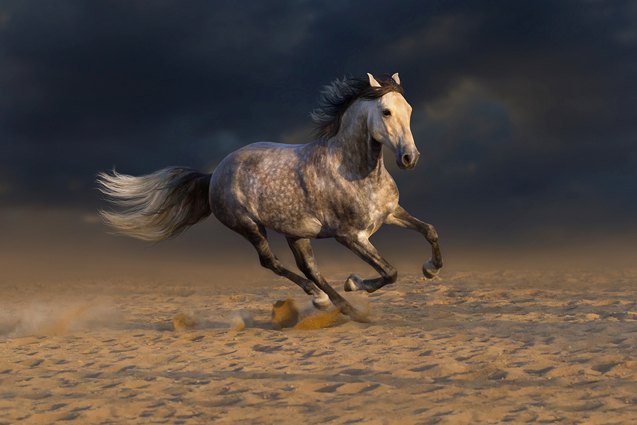The Andalusian Horse is renowned for its beauty, intelligence, and versatility. To harness these traits effectively, lunging is an essential training exercise. This andalusian horse lunging guide will walk you through the methods and benefits of incorporating lunging into your horse’s routine.

Understanding the Importance of Lunging
Lunging is a vital part of a horse’s training regimen. It not only improves physical fitness but also strengthens the bond between the horse and handler. For Andalusian horses, known for their grace and agility, lunging can enhance these natural abilities.
Benefits of Lunging Your Andalusian Horse
Lunging your Andalusian horse offers numerous benefits, including improved balance, coordination, and obedience. It is also a great way to assess the horse’s movement and identify any physical issues.
Preparing for the Lunge
Before starting, ensure you have the right equipment. A lunge line, cavesson, and whip are essential. It’s important to choose a safe and enclosed area to prevent any accidents.
Choosing the Right Equipment
Invest in quality gear. A sturdy lunge line and a well-fitted cavesson are crucial for effective lunging sessions. A whip should be used as an extension of your arm to guide the horse, not for punishment.
Setting Up the Lunging Area
Select a flat, open area free from obstacles. This ensures the safety of both you and your horse. An enclosed space, like a round pen, is ideal for beginners.
Basic Lunging Techniques for Andalusians
Start with the basics to build a strong foundation. Begin with simple walk and trot exercises. Focus on maintaining a consistent pace and ensuring the horse responds to your commands.
Walk and Trot Exercises
Begin with walking in both directions. Gradually introduce trotting to help build endurance and strength. Consistent practice is key to mastering these exercises.
Introducing Canter
Once your horse is comfortable with walking and trotting, introduce the canter. This requires more control and attention but significantly benefits the horse’s overall fitness.
Advanced Lunging Techniques
Once the basics are mastered, you can introduce more advanced techniques. These include transitions, changes of direction, and incorporating poles or obstacles.
Transitions and Direction Changes
Transitions between gaits and changing directions help improve the horse’s responsiveness and agility. Use clear commands to guide these transitions smoothly.
Incorporating Poles and Obstacles
Adding poles or small obstacles can challenge your horse and encourage greater focus and coordination. Ensure your horse is confident with basic lunging before advancing to this stage.
Common Challenges in Lunging Andalusians
While lunging offers many benefits, it can present challenges. Common issues include the horse resisting commands or showing signs of stress. Address these calmly and patiently.
Overcoming Resistance
Resistance may occur if the horse is unsure or uncomfortable. Ensure your commands are clear and consistent. Build trust through positive reinforcement.
Dealing with Stress or Anxiety
Some horses may exhibit stress or anxiety during lunging. Recognize the signs and give your horse breaks. Gradually build up the intensity of sessions.
Maintaining Consistency and Progress
Consistency is crucial in lunging. Regular sessions will lead to noticeable improvements in your horse’s fitness and behavior.
Setting Goals and Tracking Progress
Set achievable goals for each session and track your horse’s progress. Celebrate small victories to stay motivated.
Adjusting Techniques as Needed
Be open to adjusting your techniques based on your horse’s needs. Every Andalusian is unique and may require different approaches.
Health and Safety Considerations
Always prioritize your horse’s health and safety. Ensure your horse is physically fit to lunge and consult a vet if needed.
Recognizing Signs of Fatigue
Watch for signs of fatigue, such as heavy breathing or excessive sweating. Give your horse ample rest between sessions.
Ensuring a Safe Environment
Regularly inspect your lunging area for hazards. Ensure your equipment is in good condition to prevent accidents.
Additional Resources and Community Support
Don’t hesitate to seek additional resources or join communities for support. Engaging with fellow enthusiasts can offer valuable insights and tips.
Engaging with the Andalusian Enthusiast Community
Join forums or local groups to connect with other Andalusian owners. Sharing experiences can enhance your training journey.
Accessing Online Resources
Utilize online resources for further learning. Websites like eHorses offer valuable information on Andalusian horses.

FAQ
1. What is the best age to start lunging my Andalusian horse?
Starting at a young age, around 2-3 years, helps establish good habits. However, always consider the horse’s physical readiness.
2. How often should I lunge my Andalusian horse?
Lunge sessions can be done 2-3 times a week. Ensure your horse has rest days to recover.
3. Can lunging replace riding for exercise?
Lunging is a great supplement but should not replace riding. It provides different benefits and is best used alongside other training methods.
For more information on caring for Andalusian horses, visit grooming tips and feeding guide.
This article contains affiliate links. We may earn a commission at no extra cost to you.








